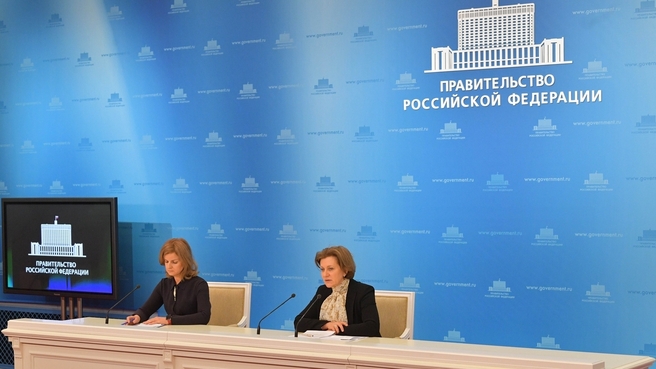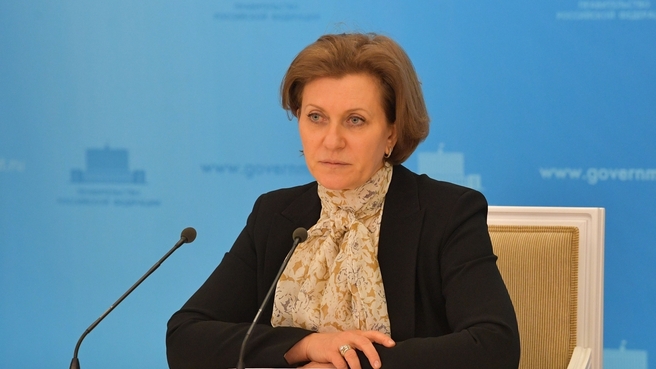Russia’s measures on countering the coronavirus infection.
Excerpts from the transcript:
Anna Popova: We have been fighting this infection for three months now. The whole world is trying to deal with it. Let me recall that on December 31, 2019 the People’s Republic of China announced complications in the epidemiological situation in China and reported this to the World Health Organisation (WHO). At that point, we started tracking the measures that we have been taking under the guidance of the emergency response centre of the Government of the Russian Federation, our Government, and the national leadership.
The first barrier that we put in place and that is still in place is quarantine control at border check points. As of today, 5,333,242 people have been checked. Tight border control is a very important element in protecting the people of the Russian Federation from what is an extremely serious and complicated problem.
We are seeing many countries where the situation is developing along a worst case scenario with explosive, exponential growth. The Russian Federation does not have this. We have limited the daily increase of new cases to 1.2 times for several days. To achieve this, we have been taking many measures, and I will talk about them a bit later.
I would like to note that every epidemiological situation develops in four phases. This is universal.
The first phase is when there is a threat or some absolutely isolated cases that are being identified.
The second phase is isolated cases of importation that we record but there is no consistent spread in the country.
The third phase is infected people that are related to those who brought the disease in. As a rule, this is already a fairly large group of people.
The fourth phase is when it is impossible to determine the source of an infection for every sick person. This is when the situation has matured and there are many sick people.
The Russian Federation is a very large country and we are proud of this. It has many regions. The 85 regions are now at different phases of the epidemiological situation.
During the past three months we have managed to parry three attacks.
The first one occurred when there was a powerful and large hotbed in the People’s Republic of China with which we have a long border and very strong migration ties. However, we managed to impose the necessary restrictions and limit the number of infected people to just two – both Chinese citizens (as I recall). The disease did not spread.
The next stage was when our compatriots returned from short holidays in the latter half of February and we managed to localise this situation as well. It developed during the subsequent two weeks.
After long holidays from February to March, after days off in early March, many Russians returned home. At that time, the epidemiological situation became much worse in many countries. At this point, we recorded serious growth in the number of cases linked with the return of our citizens from different countries. This was followed by new cases caused by contact with those who had arrived from abroad.
At present, the development of the epidemiological situation is different in the various regions of the Russian Federation. Today, 45 regions are in the first or second phase of the epidemiological process. Other regions are in the third phase, or between the third and fourth phases. This means that the epidemiological process is mounting there. At each phase we are taking measures against the epidemic and imposing restrictions to counter the spread of this dangerous virus in every region or in several regions as is the case in the Moscow region and metropolis area.
These decisions are being taken under the law on the sanitary and epidemiological wellbeing of the population – Federal Law No. 52, based on a very serious and detailed epidemiological analysis (both operational and retrospective) which includes the data on monitoring, forecast and risk assessment.
Chief government sanitary doctors in the regions are preparing proposals or instructions for the regional governors. The governors and other top agency officials in every region will decide what restrictions to impose on the population based on these documents. This is why these decisions will not be absolutely identical in every region. They correspond to the situation that is taking shape.
But considering that, as I already said, the situation has no explosive growth, which is largely owing to our timely adoption of the necessary measures, one of the main precautions is limited personal contact.
I should say that all four phases have common requirements. There are some individual requirements as well. But the main, the most important requirement in countering any infectious disease is the restriction on personal contacts. A contagious disease is passed from one person to another and the main way to prevent this is to stop close contact between people, thereby stopping the spread of the infection.
The first thing we did was cancel large public events and sports competitions, and suspend activities at large facilities where people communicate with each other a lot. This is certainly self-isolation, when people stay at home. And, of course, it is very important for high risk groups to observe self-isolation.
The high risk groups were determined from the very beginning. One of the first resolutions of the Chief State Sanitary Physician drew special attention to people older than 65 and people with chronic diseases. This was done to protect them. They are the hardest hit by the disease and require the most medical support when they are sick. These people have to stay home until the very end of the epidemiological situation and keep their personal contacts to a minimum. This is exactly what was done.
And, of course, when the situation is developing it is very important to reduce the number of people you contact, as I said. This week (nine to ten days in fact) while we were separated, including not going to work, has been a big contribution to countering the spread of the virus. This is an extremely important decision, an extremely important directive that is helping us limit the spread of the virus, the speed with which it is spreading. This is certainly valid now and will be valid for some time to come.
You know that the incubation period of this virus is 14 days, so the period of the rupture of personal contacts must also be 14 days. But 14 days are certainly not enough. There must be more days in various situations.
Today, we are seeing definite results, but it will only become obvious when there is a time lag between the end of personal contacts.
I think it is also very important to keep the public informed. In addition to no personal contact, we need to keep people up to date. We must bring home to everyone the risks of the virus and tell people how to protect themselves from it. Methods for protection are not very complicated, but they do work. Today, they are protecting and saving the health of many people.
A lot has been done to make this information campaign broad and accessible. A special website “Стопкоронавирус.рф” was created. It is seeing high usage and contains all the current information on the coronavirus situation in the country, on the measures that are being taken and on ways to protect yourself and your family from this new threat, this new challenge that all of humanity must fight.
I would also like to note that there are stages where different decisions are made at different levels and in different territories. Everything that is being required today is being implemented. One of the main elements is the preparedness of clinics. As a result of coordinated and well-considered actions, we had two and half months to take the necessary measures. They included, of course, the identification of infected people among the total number of people living in a given territory. I am referring to testing.
We are currently using Russian-made kits to test our citizens.These are being produced in adequate numbers. We have enough test kits, and there is no lack of trained people to do the testing. At first, only the experts from Rospotrebnadzor did the testing, but starting in March healthcare professionals with the right equipment stepped in.
Over the past week and a half, private companies and laboratories have joined the common effort of testing Russian citizens.
With much cooperation, we have significantly stepped up our daily testing from 2,000 on 1 March to 36,000 today. We test people and identify those with the novel coronavirus in a timely manner, provide them with medical assistance and carry out the appropriate prevention measures.
We currently have a high percent of asymptomatic patients among those who have tested positive. Slightly over 20 percent of those positive have no symptoms. Just 14 percent display the signs and symptoms of pneumonia, with moderate to severe illness. There are enough beds, and specialised medical assistance is rendered to all those needing it. This is why we should intensify our efforts and comply with all the rules and requirements. I want to emphasise this again and remind our people what they need to do to protect themselves from this disease.
First, have as little contact with others as possible. We are in self-isolation today and all of us must strictly observe it, be it young people, children or seniors. This is very important. We must protect our senior citizens in the first place so as to avoid the terrible outcome that the coronavirus can lead to.
Personal hygiene is critical, too. Keep your hands and face clean, wash them as often as possible, especially if you have gone out or have come in contact with someone. Keep your place clean. Observe disinfection rules. Call a doctor if you or a family member feels ill. Everyone must act responsibly. Do not risk either your or other peoples’ lives or wellbeing. If you start feeling sick, you must call a doctor immediately. Hotlines are opened. They will listen and give medical advice and provide you with the assistance you might need.
Naturally, it is important to apply for medical assistance even at the slightest sign of illness, so that you are tested as soon as possible. Do not wait, do not self-diagnose. I repeat, it is important to seek medical assistance. You should be aware that after a simple examination a doctor will not be able to definitively say that you only have the flu, which is also in our country, or a common respiratory infection, and not the novel coronavirus.
I sincerely wish you well, and I ask you to follow the simple, yet very important rules that we have outlined today, and that we will continue to emphasise. They can be found in pamphlets, on our websites, and on Стопкоронавирус.рф, the main website to help fight the spread of the disease.
Question: Ms Popova, you said that beginning this week there were fewer people on the street. This is important, no doubt. But what measures do you think should be carried out as a follow-up?
Anna Popova: Critically, we must not discontinue the measures that are in place. These restrictions are producing results, but it takes time. The virus is spreading. Russia is a very populous country. The situation differs from region to region. If we cancel these measures, it will result in an explosion of cases, something we want to do our best to avoid. So continuing in the same manner by imposing social distancing is unquestionably what we will be doing in future.

